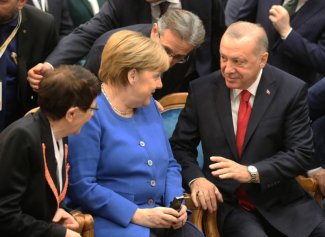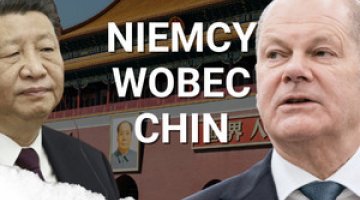The Berlin conference on Libya: a successful investment for German diplomacy

The international conference in Berlin dedicated to resolving the Libya conflict confirmed that German diplomacy is capable of effective mediation. This will strengthen Germany’s position at the halfway point of its term as a non-permanent member of the UN Security Council, as well as in shaping foreign policy within the EU. Germany’s involvement in UN efforts to stabilise Libya has confirmed its aspirations to play a greater international role. The initiation of the so-called Berlin process on Libya is German foreign policy’s most serious initiative since its involvement in resolving the Russian-Ukrainian conflict.
The conference in Berlin, which was held on 19 January, is to a great degree a personal success for Chancellor Angela Merkel and Foreign Minister Heiko Maas. It will strengthen both politicians’ positions inside their party and within the EU. It is also important for Germany in the context of the country’s upcoming presidency of the EU Council, which will include the organisation of a summit in Leipzig this autumn between EU members & China.
Why is Germany interested in the stabilisation of Libya?
Germany became involved in the search for a peaceful resolution for Libya primarily for general reasons: Libya’s importance for security in the EU neighbourhood (including the potential terrorist threat); its role in ensuring energy supplies to the EU; and above all, its location on one of the main migratory routes to Europe. However, Germany was also inspired to act by certain factors resulting from the particular nature of German policy. Germany is interested in bolstering its image as an international negotiator, as well as building up its position in the region as a partner of the Arab states. Berlin would benefit from demonstrating a prestigious achievement during Germany’s two-year term as a non-permanent member of the UN Security Council (2019-20). Germany is also looking for opportunities to strengthen its position with regard to France and the UK, and also wishes to counteract criticism that it is too little involved in crisis management in the EU’s neighbourhood.
Germany’s support for resolving the Libyan conflict may also bring about a change in how the German position is perceived, compared to that of 2011; at that time Germany abstained from a UN vote on a resolution on Libya which opened the way for the international intervention resulting in the overthrow of Muammar al- Gaddafi. Germany was criticised for distancing itself from its allies, a position which Berlin is now seeking to transform into an asset. It is presenting its position at that time as a reason why it can now act from a neutral position, without any direct interests in Libya, and can play a role as an effective facilitator of negotiations.
Preparations for the Berlin conference
The organisation of the high-level conference in Berlin on 19 January was preceded by several months of preparation which Germany carried out in consultation with Ghassan Salamé, the UN Special Envoy. The consultations, which began in September 2019, were based on the assumption that Libya could only be stabilised by limiting the involvement of the third countries supporting the warring parties, and stopping the supply of weapons in accordance with the embargo agreed upon in 2011. In this approach, the activities carried out jointly by the Chancellor’s office and the German Foreign Ministry focused on dealing with the countries involved on both sides of the conflict, while the burden of mediation between the Libyans rested mainly on the UN’s special envoy. It was only at the final stage of preparations for the conference that Germany increased the visibility of their negotiations with the Libyans. On 16 March Foreign Minister Maas received a declaration from General Khalif Haftar in Benghazi that he would come to Berlin. Chancellor Merkel’s visit to Moscow and her talks with President Putin on 11 January were another important element of the final phase of the preparations.
The aim of the conference, held under the aegis of the UN, was to obtain a declaration from those countries influencing the Libyan situation to refrain from actively supporting the warring parties and continuing to use military means. A ceasefire and a suspension of military aid are intended to create the conditions for an internal political process in the country, in accordance with the plans of the United Nations. During six preparatory meetings at the level of senior officials and key advisors, which have been conducted behind closed doors since November, the text of the agreement which the participants adopted in Berlin was worked out.
The Berlin Conference: a new boost to the peace process
Germany can take the presence in Berlin of all the relevant actors in the conflict as a success: the UN Security Council members and the countries that have the greatest influence on the situation in Libya and are actively involved on the sides of the conflict, as well as representatives of international organisations – representatives of the African Union and the Arab League were present alongside the UN (Secretary General Antonio Guterres and Envoy Salamé) and the EU. The participants reflected the divergent political, religious and economic interests interwoven in the conflict. At the invitation of Chancellor Merkel , supporters of General Haftar came to Berlin: the president of Russia, Vladimir Putin, and Abdel Fattah al-Sisi from Egypt. Also noteworthy were the talks held the day before the summit between Chancellor Merkel and Haftar’s ally Prince Muhammad bin Zayid of the United Arab Emirates (which were represented during the conference itself by the foreign minister). The supporters of the unity government recognised by the international community were represented primarily by the Turkish President Recep Tayyip Erdoğan. As permanent members of the UN Security Council, France and the UK were represented by Emmanuel Macron and Boris Johnson.
From a European perspective the presence of US Secretary of State Mike Pompeo was of particular importance, as it confirmed the desire for trans-Atlantic cooperation in stabilising the Mediterranean. The prominent representation of China should also be noted; it was represented by Yang Jiechi, director of the Office for Foreign Policy of the CCP’s Central Committee and a member of the PolitBuro of the CCP’s Central Committee. The conference was also attended by the Italian Prime Minister Giuseppe Conte as well as by the presidents of Congo and Algeria as regional mediators. A representative from neighbouring Tunisia withdrew as he had only been invited at the last minute.
The conference created a framework not only for plenary talks, but also for numerous bilateral talks, including between Presidents Putin and Erdoğan.
The Libyan parties to the conflict also participated in the talks in the Chancellor’s Office: the Prime Minister of the Government of National Reconciliation, Faiz as-Sarraj, and the commander of the Libyan National Army, Khalif Haftar. These talks, however, were conducted on a one-to-one basis; they did not participate in the plenary as equal parties. The success of the conference was in question until the last minute because Haftar’s supporters failed to comply with the previously agreed ceasefire, and maintained their blockade of ports in the east of Libya.
Results of the conference
The conference’s participants adopted conclusions containing 55 points, and preconditions enabling the start of a political process in Libya were agreed upon. The next steps were planned under the auspices of the United Nations, which helped to limit any showboating from Turkey and Russia. Above all, emphasis was placed on the will to comply with the arms embargo and suspend all military assistance from outside parties to the civil war. But no agreement was reached on how to ensure greater control of the embargo, and as a consequence no mechanisms for its supervision have been agreed on at this stage. No decisions have been taken on who will assume responsibility for monitoring the truce in the future, nor was agreement reached on the withdrawal of mercenaries and weapons.
The internal dimension of the peace process will begin with the appointment of a Military Committee, on which each of the parties to the conflict will have five representatives. The task of this committee will be to transform the temporary ceasefire into a lasting truce, formalised in accordance with the Salamé plan. Germany has emphasised that designating the individuals who will be represented on this committee is the first sign of a willingness for dialogue, on Haftar’s part in particular.
As part of the further proceedings under the UN's auspices, it was agreed that a ministerial conference will be held in Berlin in February, to which concerned countries which did not participate in the January conference will be invited. The Berlin arrangements are to be formalised by being included in a binding resolution of the UN Security Council.
How Germany benefits
As it is unclear how the states involved in the conflict will act in future, Germany has taken care to cool down any expectations for the new peace process, and has taken great care in communicating its own diplomatic success. Emphasis has been placed on the gradual nature of the activities intended to lead to the stabilisation of Libya. Just achieving a noticeable reduction of external involvement in the conflict will count as a success. Germany is hoping to defend its image as an effective mediator in this way. At the same time, Germany has also secured itself an active role in the next stages of the peace process, and will remain active on a bilateral level. The Libyan question will probably be one of the topics of Chancellor Merkel’s talks with President Erdoğan during her visit to Turkey on 24 January.
The conference in Berlin has helped Germany to demonstrate its support for multilateralism. It was constantly emphasised that the German initiative was aimed at supporting the United Nations' actions to bring about lasting peace and stability in Libya. This state of affairs means that responsibility for the peace process can be shared, and strengthens Germany’s position during its second year as a non-permanent member of the UN Security Council, during which it chaired a committee to impose an arms embargo on Libya. The German initiative on Libya also helps to support German demands to reform the UNSC and join the group of countries which have a decisive vote on the body.
This taking of the initiative – and the associated political risk – was also a result of the German political class's conviction that, given the increasing distance between European countries and the US, they need to undertake independent efforts (ideally within multilateral frameworks) to ensure the stability of the EU’s neighbourhood.
From the German perspective, the support for a diplomatic solution declared by all the participants is an unquestionable success. However, the German dogma questioning the use of military means to resolve conflicts may be undermined in Libya, just as it was challenged in the case of Syria. Thanks to the successful conduct of the conference, however, Germany has now gained some arguments against those critics who accuse it of being insufficiently involved in stabilising the EU’s neighbourhood, especially by military means.
The question of Germany assuming more responsibility in Libya was the subject of German discussions during the Berlin conference. Defence minister Annegret Kramp-Karrenbauer, head of the CDU and a contender for the office of chancellor, conceded that direct German involvement in overseeing the ceasefire and the arms embargo was possible. For her part, Chancellor Merkel was more restrained in this regard, as was foreign minister Maas, who highlighted the need for further discussions on the division of responsibilities between the participants; among other questions, he emphasised the ambivalent attitude which some African countries hold towards a European military presence in Africa. Undoubtedly, expectations of how Germany can contribute will rise in this respect, as the conference reaffirmed Berlin’s ambitions to play a greater international role. This will apply to its willingness to become more involved in both the civilian and military dimensions. In this context, the challenge for Germany will lie in any discussions of the EU’s commitment to supervising the truce and ensuring compliance with the embargo. The EU’s High Representative for Foreign Affairs and Security Policy Josep Borrell is in favour of such a mission, as is the Italian Prime Minister, who has also simultaneously announced that his country is ready to participate in such activities.
Support for developing a coherent EU position on Libya would represent another success for Germany. The importance in EU policy of stabilising the country, for reasons connected with migration, energy and security, was demonstrated by the full representation in Berlin of the EU institutions (the Presidents of the Commission and the European Council, and the EU’s High Representative for Foreign Affairs and Security Policy). It will be of essential importance for further cooperation between EU members on the Libyan question if Germany can reconcile the interests of France and Italy (with the interests of the Eni and Total companies behind them). However, the EU’s ability to act could be severely undermined by the failure to invite Greece to the Berlin conference; Athens is afraid of excessive concessions being made to Erdoğan, including in matters linked to the exploitation of gas fields in the Mediterranean Sea.
The success of the Berlin conference is largely a personal achievement for Chancellor Merkel and Foreign Minister Maas, who have benefited not only internationally but also domestically. Merkel invested her political capital in the risky initiative, and confirmed the ability previously attributed to her of managing crises; Minister Maas took the chance to emerge from the shadow of his predecessor Frank-Walter Steinmeier. This strengthens the position of both politicians in Germany and abroad ahead of the upcoming German presidency of the EU, whose programme includes the organisation of an autumn summit between EU members & China in Leipzig.




